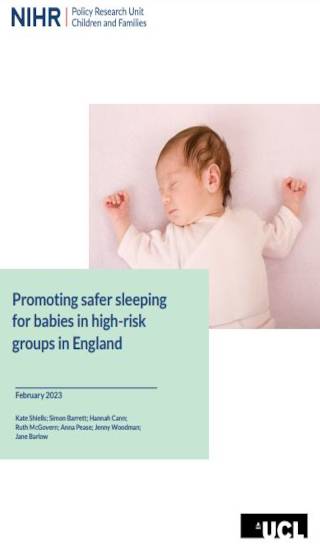Latest News
HDR-UK Health Data Science Black Internship Programme Summer Internship with CPRU
This summer, CPRU had the pleasure of hosting Ashleigh Onabajo, an MSc Public Health & Health Promotion student, at the UCL Institute of Child Health through the
HDR-UK Health Data Science Black Internship Programme. Ashleigh conducted an exemplar analysis using publicly available data for research. Ashleigh’s project used two publicly available datasets to describe the variation in 2-2½ year health and development and Ages and Stages Questionnaire (ASQ®-3) scoring across local authorities in England for the year 2020-2021. This project contributes to the wider
research being undertaken by the CPRU team looking at how we can use the individual level data on child development at age two contained in the Community Services dataset to understand trends and disparities.
To read the full report click here:
New publication: The impact of area level mental health interventions on outcomes for secondary school pupils: Evidence from the HeadStart programme in England
Abstract: In light of the dramatic rise in mental health disorders amongst adolescents seen in the past decade across the world, there is an urgent need for robust evidence on what works to combat this trend. This paper provides the first robust evaluation of the impacts on school outcomes of 6-year funding programme (
HeadStart) for area-level mental health interventions for adolescents. Exploiting educational administrative data on ten cohorts of state-educated
secondary school students, we use the synthetic control method to construct counterfactual outcomes for areas that received the funding. We show that the funding did not affect students’
absenteeism or academic attainment, but it prevented around 800 students (c. 10% of students typically excluded yearly) from being excluded in its first year. The transient nature of this effect suggests that sustained funding for intervention may be a necessary but not sufficient condition to maintain programme effectiveness over time.
Full article can be found here
New publication: Family adversity and health characteristics associated with intimate partner violence in children and parents presenting to health care: a population-based birth cohort study in England
We examined the associations between family adversities, health characteristics, and IPV in children and parents using linked electronic health records (EHRs) from primary and secondary care between 1 year before and 2 years after birth (the first 1000 days). We compared parental health problems in in children and parents with and without recorded IPV. Two in five of the children and parents presenting to health care had recorded parental mental health problems, parental substance misuse, adverse family environments, or high-risk presentations of maltreatment in the first 1000 days. One in 22 children and parents with family adversity also had recorded IPV before age 2 years. Primary and secondary care staff should safely ask about IPV when parents or children present with family adversity or health problems associated with IPV, and respond appropriately.
Full article can be found here
CPRU investigates the promotion of safer sleeping for babies in high-risk groups in England
Whilst the ‘Reduce the Risks’ campaign of the 1990s resulted in a fall in the number of unexpected infant deaths, recent reports have found higher rates of deaths amongst families living in the most deprived neighbourhoods in England.
We carried out a mixed methods study of Sudden Unexpected Death in Infancy (SUDI).
Our findings suggest that change to current practice is needed if the risk of SUDI in this particular group of families is to be further reduced.
Read more









 Close
Close







